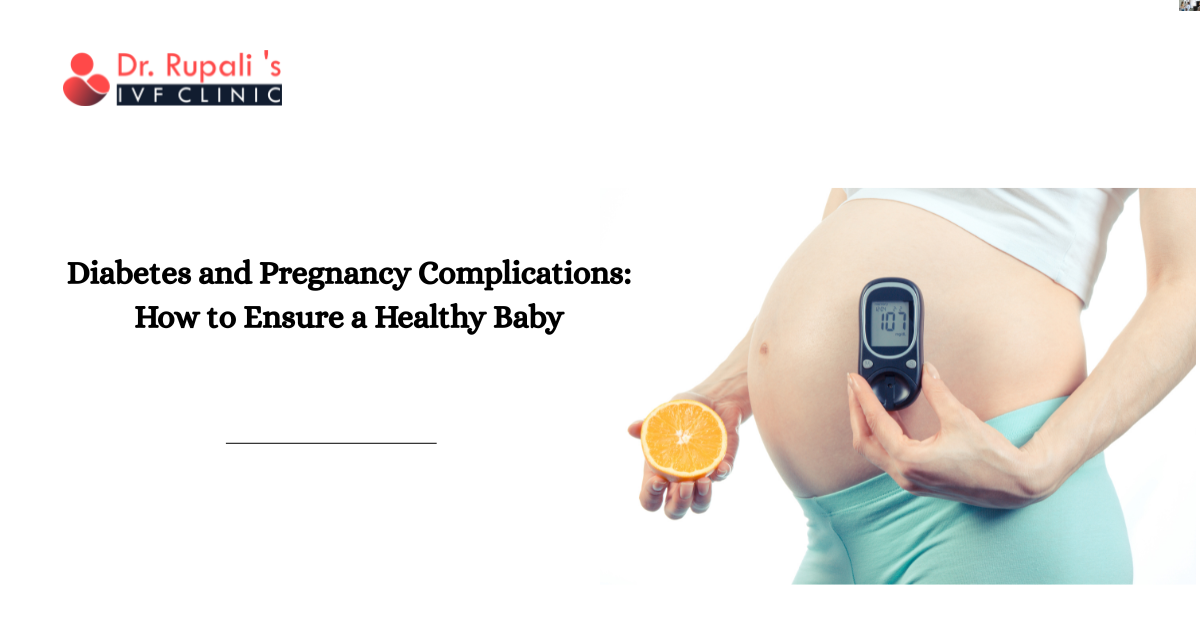
Pregnancy is a momentous and deeply emotional journey in a woman’s life. It is also a time when existing health conditions—such as diabetes—can have amplified effects, posing risks both to the mother and the developing baby. But with careful monitoring, medical support, and lifestyle management, many of these risks can be mitigated, and a healthy baby is very achievable. In this blog, we will explore how diabetes affects pregnancy, the complications that can arise, and practical strategies to ensure both mother and child thrive. Along the way, we’ll also highlight how choosing the best IVF specialist in New Delhi can play a pivotal role in managing diabetes in pregnancies conceived through fertility treatments.
Bringing a baby into the world is a beautiful journey—but if you’re managing diabetes, it can feel a bit like walking a path with extra stepping stones. You can absolutely have a safe pregnancy and a healthy baby, but it requires awareness, planning, and the right medical support. Think of it like driving a car on a rainy day: the road is the same, but you just need to be a little more careful with the steering.
In this detailed guide, we’ll walk through everything you need to know about diabetes and pregnancy—what complications may arise, how to prevent them, and how to give your baby the healthiest possible start.
1. Understanding Diabetes in Pregnancy
Diabetes affects how your body uses sugar for energy. During pregnancy, hormonal changes can influence how well your body controls blood sugar. When sugar levels go too high, it may cause complications for both the mother and the baby. But with proper care, most women with diabetes have smooth, healthy pregnancies.
2. Types of Diabetes Affecting Pregnancy
2.1 Type 1 Diabetes
This occurs when the body does not produce insulin. Women with Type 1 diabetes need insulin therapy throughout pregnancy.
2.2 Type 2 Diabetes
This happens when the body doesn't use insulin effectively. It may be controlled with medication, insulin, or lifestyle changes.
2.3 Gestational Diabetes
Some women develop diabetes only during pregnancy. It usually resolves after delivery but still requires close monitoring.
3. How Diabetes Can Impact Pregnancy
When blood sugar levels remain high for long periods, it can affect both mother and baby.
Common complications may include:
High blood pressure
Preterm birth
More chance of needing a C-section
Higher risk of infections
But remember-- these risks drop significantly with good blood sugar control.
4. Health Risks for the Baby
High maternal blood sugar can influence the baby's growth and development.
4.1 Larger Birth Weight
Babies may grow bigger than usual (a condition called macrosomia), which can make delivery harder.
4.2 Low Blood Sugar After Birth
The baby may develop hypoglycemia shortly after delivery because their insulin levels are high.
4.3 Breathing Problems
Some babies may face temporary breathing issues after birth.
4.4 Increased Risk of Type 2 Diabetes Later
While not guaranteed, babies born to mothers with diabetes may have a higher chance of developing Type 2 diabetes in adulthood.
5. Pre-Pregnancy Planning for Women With Diabetes
If you have diabetes and are planning a pregnancy, preparation is essential.
Have a preconception check-up
Discuss medication adjustments
Improve your diet and exercise routine
Check for diabetes-related complications like kidney or eye issues
Women undergoing fertility treatments may also consult the best IVF specialist in New Delhi, especially if diabetes makes conceiving challenging.
6. Importance of Blood Sugar Control
Think of blood sugar control as the "heart" of a healthy diabetic pregnancy.
6.1 Why Is It So Important?
Stable sugar levels help the baby grow normally and reduce the risk of complications.
6.2 How to Maintain It
Follow your diet plan
Monitor blood glucose regularly
Take medicines or insulin as prescribed
Avoid skipping meals
7. Healthy Diet Tips for Expecting Mothers With Diabetes
Your diet plays a huge role in maintaining your health.
7.1 Balanced Meals
Include a mix of:
Whole grains
Lean proteins
Fiber-rich vegetables
Healthy fats
7.2 Small Frequent Meals
Eating smaller meals more often can help prevent spikes in sugar.
7.3 Avoid Sugary Foods
Minimize sugary drinks and desserts to prevent sudden blood sugar increases.
8. Role of Exercise During Pregnancy
Exercise acts like a natural insulin booster. Even simple movements help.
8.1 Safe Exercises
Walking
Prenatal yoga
Light stretching
8.2 Benefits
Helps control blood sugar
Supports healthy weight
Reduces stress
Always follow your doctor's exercise recommendations.
9. Monitoring and Medical Tests
You may require more frequent check-ups during pregnancy.
9.1 Routine Tests
Blood glucose tests
HbA1c
Ultrasound scans
Fetal monitoring
9.2 Why More Monitoring?
Because keeping a close eye helps catch issues early.
10. Gestational Diabetes: What Makes It Different?
Gestational diabetes usually appears during the second or third trimester.
10.1 Who Is at Risk?
Women over 30
Those with PCOS
Those overweight
Women with a family history of diabetes
10.2 Can It Be Managed?
Yes-- most women manage it with diet and lifestyle changes.
11. Role of Your Healthcare Team
Pregnancy with diabetes isn't a one-person job. Your healthcare team may include:
Obstetricians
Diabetologists
Nutritionists
Endocrinologists
And when needed, IVF specialists
Each expert helps ensure safer pregnancy outcomes.
12. How IVF Specialists Support High-Risk Pregnancies
Many women with diabetes require help to conceive or maintain a healthy pregnancy.
The best IVF specialist in New Delhi can:
Guide safe fertility treatments
Monitor blood sugar levels during the IVF process
Provide personalized plans for high-risk cases
Ensure safe embryo transfer and pregnancy monitoring
Their support can make conception smoother and safer for diabetic moms.
13. Emotional Well-being During Pregnancy
Pregnancy already comes with emotional ups and downs. When diabetes enters the picture, stress can increase.
13.1 Managing Stress
Practice meditation
Talk to loved ones
Seek counseling if needed
13.2 Why Emotional Health Matters
Stress hormones can affect blood sugar levels, so staying calm benefits both mother and baby.
14. Delivery and Postpartum Care
Delivery plans may differ depending on your blood sugar levels and baby's growth.
14.1 Choosing the Right Delivery Plan
Your doctor may recommend:
Normal delivery
Induced labor
C-section (if needed).
14.2 Postpartum Care.
After delivery:.
Blood sugar levels may change.
Breastfeeding is encouraged.
Postpartum check-ups are essential.
Gestational diabetes often goes away after childbirth-- but keep monitoring as you may have a higher chance of developing diabetes later.
15. Final Tips for a Healthy Pregnancy.
Keep blood sugar levels stable.
Follow a balanced diet.
Exercise regularly.
Stay connected with your healthcare team.
Seek support from experts when needed.
Remember, a healthy pregnancy with diabetes is absolutely possible-- you just need the right guidance, preparation, and mindset.
Conclusion.
Diabetes during pregnancy may bring challenges, but it doesn't define your journey. With careful planning, good medical guidance, and lifestyle adjustments, you can enjoy a safe pregnancy and welcome a healthy baby. Think of it as a team effort-- your doctors, your support system, and you working together toward one beautiful goal.









Write a comment ...